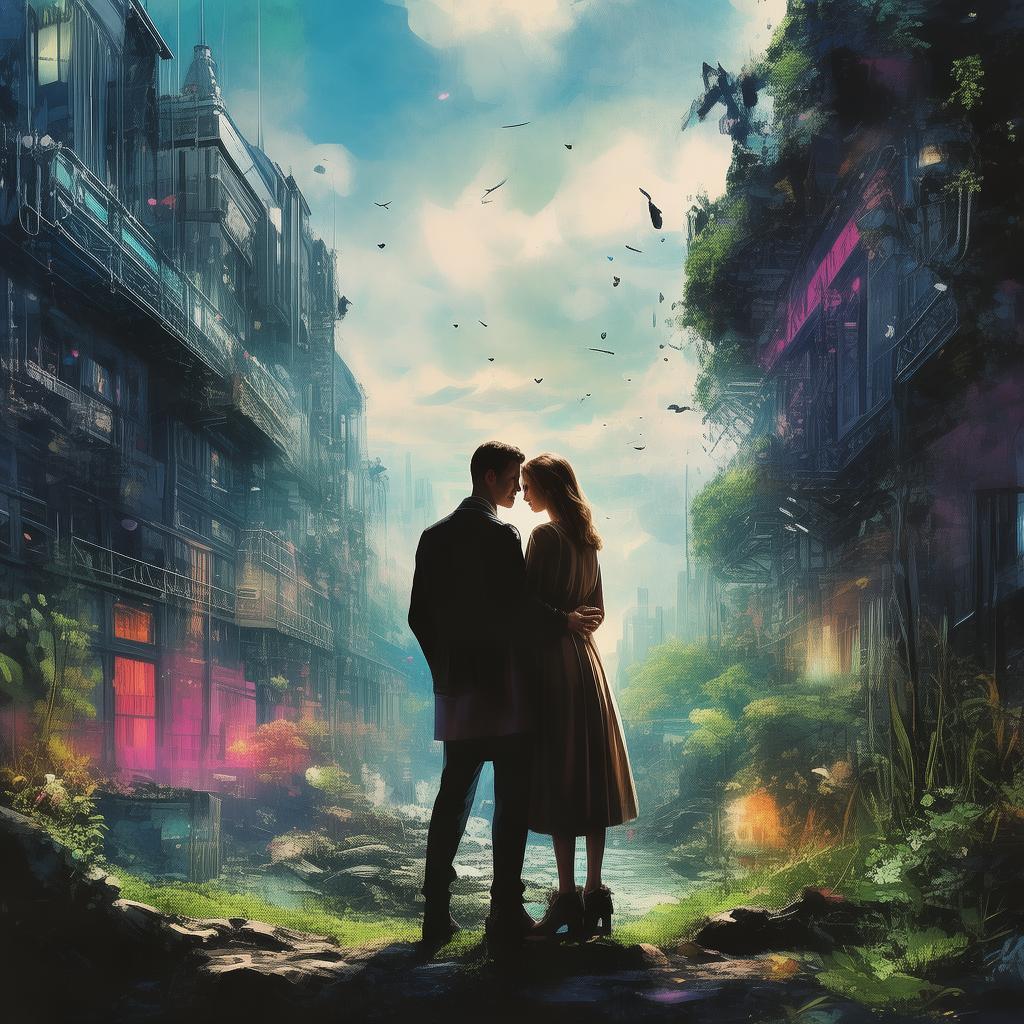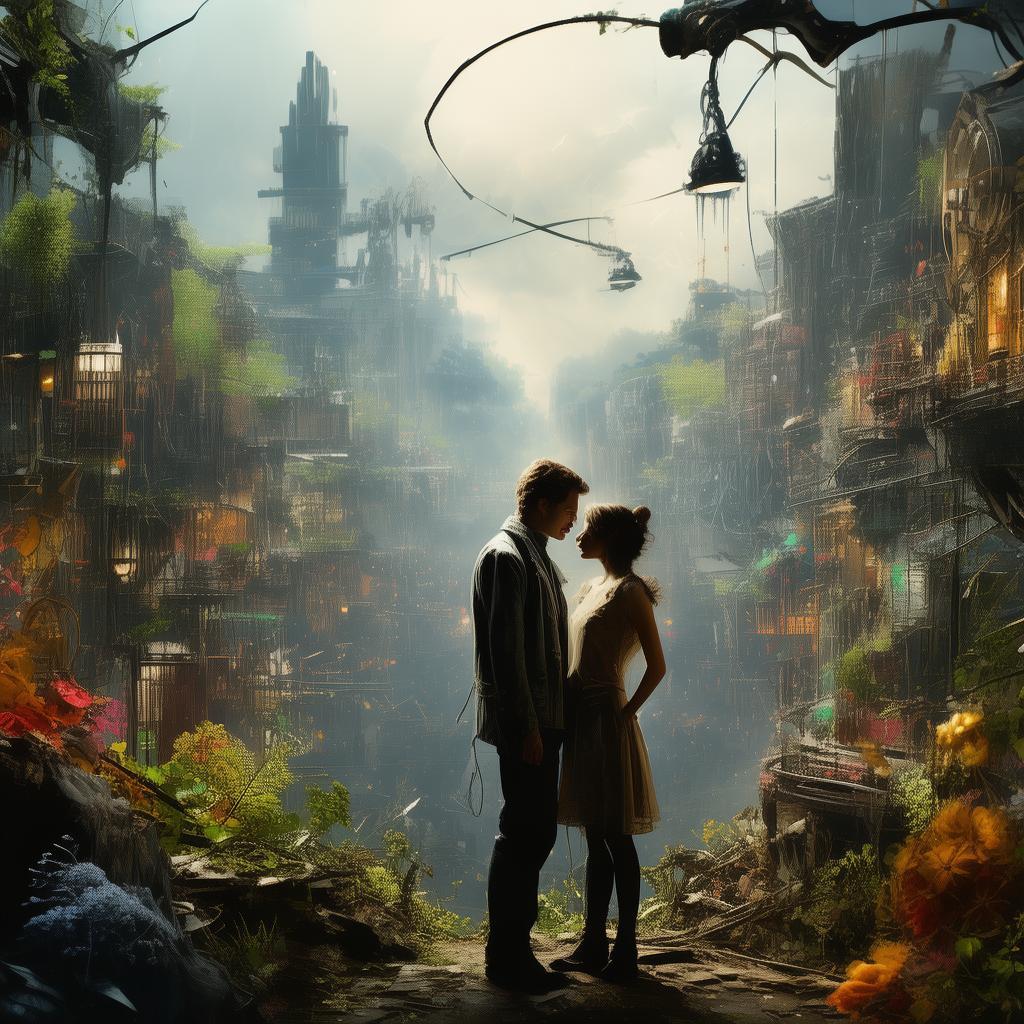Whispers of the Clockwork
In the heart of the bustling steampunk city of Chrono, where steam-powered gears and brass cogs dominated the skyline, lived two individuals whose destinies were bound by a love that defied all odds. Their names were Elara and Silas, and they were as different as night and day.
Elara was the daughter of the city's most esteemed inventor, a woman whose mind was as sharp as her needles, and whose creations were as intricate as the clockwork mechanisms that powered Chrono. Silas, on the other hand, was a street urchin, a scavenger of the underbelly, whose hands were stained with the grime of the city and whose eyes were as hard as the iron he scavenged.
Their love was as clandestine as it was passionate. They met in the shadowed alleys of Chrono, where their whispers were the only sound that dared to challenge the oppressive silence of societal norms. Elara's heart was a mechanical marvel, a device she had created as a child, a symbol of her own inner strength and resilience. It was this heart that had become the centerpiece of her father's latest invention—a mechanical heart capable of sustaining life without the need for a human one.
Silas had discovered Elara's heart in a heap of discarded parts. It was then that he knew she was no ordinary girl. He saw in her the same spark that had driven him to survive the unforgiving streets of Chrono. Their connection was instantaneous, and in the secret nooks of the city, they found solace in each other's company.
One fateful evening, as the moon hung low and the stars began to twinkle, Silas presented Elara with a gift that was as unexpected as it was precious—a mechanical heart that he had crafted from the scraps of his own life. It was a symbol of his love, a testament to the fact that even the most broken among us could find a way to love and be loved.
But their love was not to be. Elara's father, a man who valued order and tradition above all, had learned of their affair. In a fit of rage, he ordered Silas to leave Elara and never return. The inventor's decree was as absolute as the ticking of the mechanical heart he so cherished.
Devastated, Elara turned to her father, her voice filled with the pain of unspoken words, "Why? Why must you stand in the way of our love?"
Her father, a man of logic and reason, replied with the same coldness that had defined his relationship with his daughter for years, "Elara, this is not about love. It is about the future of Chrono. You are the heir to my inventions, and Silas is nothing but a stain upon our family's honor."

Elara, unable to bear the thought of losing Silas, decided to run away with him. But their escape was short-lived. The inventor's men caught up to them, and in a desperate struggle, Silas was gravely injured. It was then that Elara revealed the truth about her mechanical heart—the heart that had been the source of her father's latest creation—was a prototype, and she had been using it to keep her father's inventions alive.
The revelation shocked both Elara and her father. The inventor, a man who had always believed his daughter to be a mere pawn in his grand design, realized the depth of her sacrifice and the love she had for Silas. In that moment, he saw his daughter for the first time as a woman with her own heart and mind.
As the inventor tended to Silas's wounds, Elara whispered to him, "Father, I love him. I love him with all my heart, and I cannot live without him."
The inventor, touched by his daughter's courage and honesty, agreed to let them go. He saw that the world was not as black and white as he had always thought, and that love could exist in the most unexpected places.
The story of Elara and Silas spread like wildfire through the streets of Chrono, a testament to the power of love in a world that seemed to be against them. Their love became a symbol of hope for those who were marginalized and oppressed by the rigid societal structures of the time.
In the end, Elara and Silas were married in a simple ceremony, surrounded by the people who had supported them throughout their struggle. And as they exchanged vows, their mechanical hearts, once symbols of their pain, became symbols of their love and resilience.
Their story lived on in the hearts of those who heard it, a reminder that even in the most unforgiving of worlds, love could find a way to thrive.
✨ Original Statement ✨
All articles published on this website (including but not limited to text, images, videos, and other content) are original or authorized for reposting and are protected by relevant laws. Without the explicit written permission of this website, no individual or organization may copy, modify, repost, or use the content for commercial purposes.
If you need to quote or cooperate, please contact this site for authorization. We reserve the right to pursue legal responsibility for any unauthorized use.
Hereby declared.









